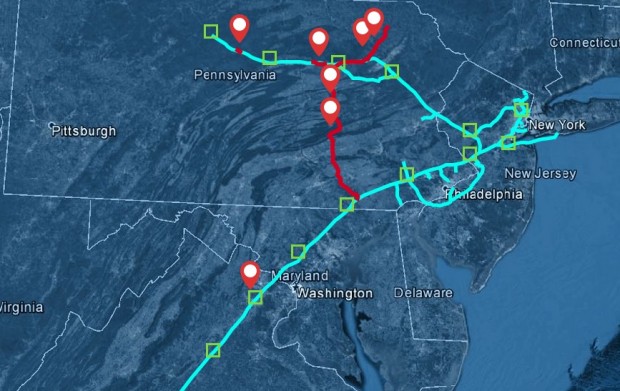DEP issues water permits for Atlantic Sunrise pipeline
-
Marie Cusick

Courtesy: Williams
The red lines show the Atlantic Sunrise Pipeline expansion. The light blue lines are the existing Transco system. Williams
Pennsylvania environmental regulators approved key water permits for the Atlantic Sunrise Pipeline Thursday, allowing construction to move forward on the natural gas transmission line.
The line is an expansion of the existing Transco system, which has over 10,000 miles of pipeline moving natural gas to other businesses, such as utility companies and power plants. The Atlantic Sunrise is designed to ship Marcellus Shale gas southward, from northeastern Pennsylvania to markets along the east coast, including an export terminal under construction in Maryland.
The Pennsylvania Department of Environmental Protection issued so-called Chapter 105 and 102 permits, which are needed for water obstruction and encroachment, and erosion and sediment controls, respectively.
“DEP undertook a thorough review of these permit applications, and factored in thousands of comments from Pennsylvania residents,” said DEP Secretary Patrick McDonnell in a statement. “DEP’s technical staff reviewed the comments in evaluating the revised plans and final permit conditions that must be met throughout the construction process of this pipeline.”
Williams, the company building the Atlantic Sunrise, says it also received a necessary Clean Water Act permit from the U.S. Army Corps of Engineers on Tuesday. With these final permits in hand, the company plans to begin construction this fall and expects the pipeline will be fully operational by mid-2018.
In February the Federal Energy Regulatory Commission (FERC) gave its approval, allowing Williams to use eminent domain against landowners who had resisted the project. It was authorized take the final five holdout properties earlier this month.
“The Atlantic Sunrise project has been through a rigorous, thorough review process in Pennsylvania,” Micheal Dunn, Williams’ executive vice president and chief operating officer said in a statement. “We are committed to installing this important infrastructure in an environmentally responsible manner and in compliance with the state’s high environmental standards.”
The Pennsylvania DEP has yet to authorize an air quality plan for air emissions related to construction activities in Lancaster County, but a Williams spokesman says the company expects to receive that soon.
The project has been a lightning rod for controversy since it was first announced three years ago. It will run through 10 Pennsylvania counties (Susquehanna, Luzerne, Schuylkill, Wyoming, Columbia, Northumberland, Lancaster, Lycoming, Clinton and Lebanon.) The most vocal opposition has come from Lancaster County, an area known nationally for its farmland preservation efforts. Opponents set up an encampment earlier this year and have pledged to use nonviolent direct action to block construction of the project.
Malinda Clatterbuck, of the protest group, Lancaster Against Pipelines, says it is no surprise to see the DEP issue these permits.
“It’s really unfortunate DEP doesn’t take its mission to protect the environment seriously, as we see in other states, like New York,” she says, referring to that state’s denial of water permits for another Williams pipeline. “[New York is] more interested in the protecting the environment than letting the industry do whatever the hell it wants.”
Earlier this summer Williams paid $2.8 million to buy the farm where the encampment was being hosted. The price tag was roughly a million dollars more than 107 acre property is worth, according to LNP.
Protesters say they have drawn inspiration from the fight against the Dakota Access pipeline and will continue their efforts. Clatterbuck says the group continues to prepare for nonviolent mass action and this DEP decision only “increases our resolve.”
A group of Catholic nuns in Lancaster County whose property is impacted is also suing FERC— the key agency with authority over the project–alleging it’s a violation of their religious freedom. Another lawsuit, brought by environmental groups, alleges FERC is improperly delaying their request for a rehearing to challenge the certificate authorizing the project.
















